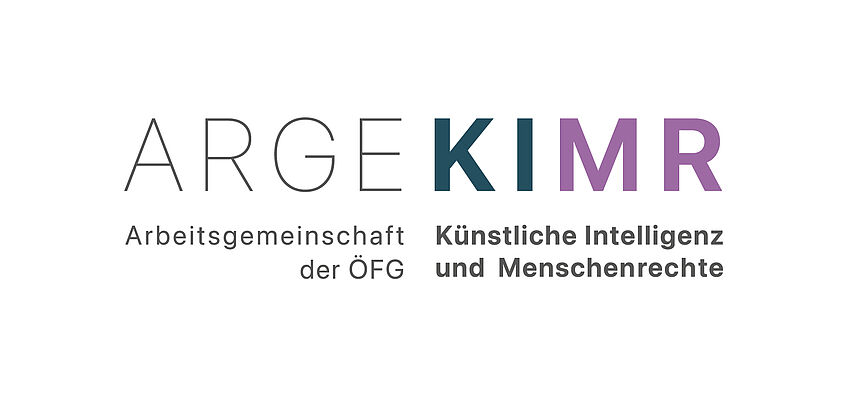Artificial Intelligence and Human Rights
Working group of the Austrian Research Foundation

Description of the working group
Artificial intelligence (AI) has become omnipresent and significantly influences the state, society and individuals. It is essential for coping with the pandemic. It changes the healthcare sector and individual healthcare. It is indispensable for traffic control and for partially regulating economics, such as through labour market administration or job recruitment. It is used for combating crime and in many other areas of our lives, even for steering individual behaviour. The resulting opportunities are enormous as are the threats and risks: The use of AI interferes with legally protected rights protected by national and European constitutional law as well as international human rights, first and foremost, the right to privacy. It is still unclear whether the potential threat just concerns certain human rights or whether it, more fundamentally, concerns the common core of all human rights, namely a human person’s autonomy. This poses the question of whether and how AI is regulated or should be regulated, i.e. which governance approaches or opportunities are possible as well as the limits of regulation.
The AI and Human Rights working group wants to address these problems. It is an interdisciplinary research group focussing on law. Its research should contribute to more legal certainty in an adequate governance framework for this topic, a governance framework taking account of both the opportunities and the threats and risks of Artificial Intelligence.
Symposia
AI Act: Executive Legislation, Standardisation, Certification and Fundamental Rights Impact Assessment
11. June 2024
On 11 June 2024 from 9:15 a.m., the third conference of the ÖFG ARGE Artificial Intelligence and Human Rights will take place at the Juridicum Wien DG under the title ‘Executive Legislation, Standardisation, Certifications and Fundamental Rights Impact Assessment’.
AI-Regulation: China-EU-Dialogues
21. - 22. Febuary 2024
From 21 to 22 February 2024, the second conference of the ÖFG ARGE Artificial Intelligence and Human Rights will take place at the University of Macau under the title ‘The Regulation of Artificial Intelligence: EU - China Dialogues’.
AI – Human Rights Fundamentals and Limitations
16 November 2023
The first symposium addresses fundamentals of human rights and the limitations of AI development and AI application. The topics covered range from socio-technological foundations, the EUs specific regulation approach, to the (missing) impact of single fundamental and human rights. In choosing the speakers, we paid special attention to including young scholars. With the invitation of Rostam J. Neuwirth we could furthermore win an international expert on AI regulation for the symposium.
Members of the working group
Univ.-Prof. Dr. Iris Eisenberger
Chair of the Working Group, Professor of Innovation and Public Law, University of Vienna
Deputy Chair of the Working Group, Professor of International Law, University of Graz
Univ.-Prof. Dr. Nikolaus Forgó
Professor of IT and IP Law, University of Vienna
Chair of the Young Section of the working group, PhD student in Interdisciplinary Legal Studies Environment and Bio-Resources Management, University of Vienna
Univ.-Prof. Dr. Andreas Holzinger
Professor of Digital Transformation in Smart Farm and Forest Operations, BOKU – University of Natural Resources and Life Sciences, Vienna
Univ.-Prof. Dr. Matthias Kettemann
Professor of Innovation, Theory and Philosophy of Law, University of Innsbruck
Post-Doc, Public Law, University of Salzburg
Univ.-Prof. (SFU) Dr. Konrad Lachmayer
Professor of Public Law, European Law and Fundamentals of Law, Sigmund Freud Private University Vienna
Uni:Docs Fellow at the Department of Legal Philosophy, Mathematics, University of Vienna
Professor of Robopsychology, Johannes Kepler University Linz
Post-Doc, Technology Studies, University of Graz
Dr. Florian Sebastian Werni, BA
Post-Doc, Department of Innovation and Digitalisation in Law, University of Vienna
Young Section
The Young Section of the ÖFG-AG on ‘AI and Human Rights’ brings together young researchers from various disciplines. The aim is intensive networking within the Austrian research landscape, continuous joint publication activities and a close connection to the scientific activities of the ÖFG-AG on ‘AI and Human Rights’.
Activities
- Joint workshops and meetings
- Joint research and publication activities
- International research networking
Events of the Young Section
Issue presentation juridikum 2/2024
Artificial intelligence in the legal sciences
The Young Section of the Austrian Research Foundation's working group ‘AI and Human Rights’ cordially invites you to the issue presentation on 14 October 2024 from 15:00 to 17:30 in the Old Chapel (Spitalgasse 2, 1090 Vienna) on the campus of the University of Vienna.
In the current issue of juridikum members of the Young Section deal with the question of how legal research on AI can benefit from interdisciplinary approaches and which methodological problems arise in this context. The findings will be discussed by the authors in a panel discussion.
We look forward to receiving your registration by email to office.eisenberger.id@univie.ac.at by 04 October 2024 at the latest.
Catering will be provided!
Members of the Young Section
Co-Chair of the Young Section, Department of Innovation and Digitalisation in Law, University of Vienna
Co-Chair of the Young Section, Department of Innovation and Digitalisation in Law, University of Vienna
VICESSE
Department of Legal and Constitutional History, University of Vienna
Department of Public Law and Political Science, University of Graz
Austrian Academy of Sciences, Department of Technology Assessment, Vienna
Department of Innovation and Digitalisation in Law, University of Vienna
Johannes Kepler University Linz
Department of Legal Philosophy, University of Vienna
Department of Innovation and Digitalisation in Law, University of Vienna
Department of Public Law, in particular Digitalisation Law, University of Speyer
Department of Public Law, University of Salzburg
Uni:Docs Scholarship Department of Legal Philosophy, Mathematics, University of Vienna
Department of Public Law and Political Science, Universität of Graz
Department of Civil Law, University of Vienna
IDea_Lab, University of Graz
Department of Legal Theory and Future of Law, University of Innsbruck
Research Network Data Science, University of Vienna
